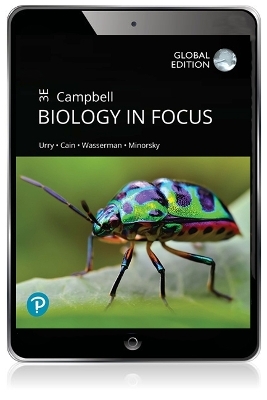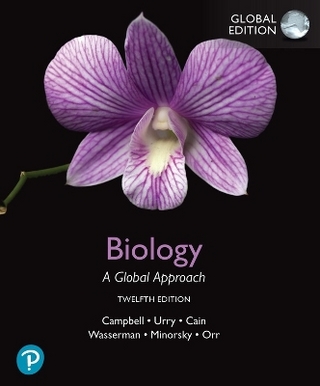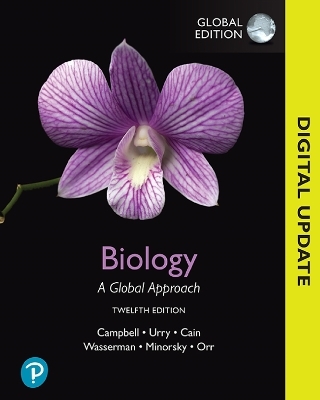
Campbell Biology in Focus, Global Edition -- Mastering Biology with Pearson eText
Pearson Education Limited (Hersteller)
978-1-292-36279-3 (ISBN)
Focus. Practice. Engage.
Built unit-by-unit, Campbell Biology in Focus achieves a balance between breadth and depth of concepts to move students away from memorisation. Streamlined content enables students to prioritise essential biology content, concepts, and scientific skills that are needed to develop conceptual understanding and an ability to apply their knowledge in future courses. Every unit takes an approach to streamlining the material to best fit the needs of instructors and students, based on reviews of over 1,000 syllabi from across the country, surveys, curriculum initiatives, reviews, discussions with hundreds of biology professors, and the Vision and Change in Undergraduate Biology Education report.
Maintaining the Campbell hallmark standards of accuracy, clarity, and pedagogical innovation, the 3rd Edition builds on this foundation to help students make connections across chapters, interpret real data, and synthesise their knowledge.
A new chapter in learning
Pearson eText is an affordable, easy-to-use digital textbook. With Pearson eText, you can access the book anytime, anywhere, using your favourite mobile device, even when offline.
You can easily retrieve and review important content using the eText search, bookmarks, highlights, and notes. Some titles also include embedded media and study tools. And you get all of this for a fraction of the cost of a printed text.
Learn on the go. Read, practice, and study on any device. Read anytime and anywhere via the Pearson eText mobile app — even offline.
Make it your own. Add notes and highlights directly in your eText to study how you'd like.
Find what you need. Quickly navigate the content with easy search and bookmark options.
Time limit
This product is only available for a 12 month subscription period starting from the date of purchase.
Lisa A. Urry (Units 1 and 2) is Gibbons Young Professor of Biology at Mills College. After earning a B.A. at Tufts University, she completed her Ph.D. at the Massachusetts Institute of Technology (MIT). Lisa has conducted research on gene expression during embryonic and larval development in sea urchins. Deeply committed to promoting opportunities in science for women and underrepresented minorities, she has taught courses ranging from introductory and developmental biology to a nonmajors course called Evolution for Future Presidents. Michael L. Cain (Chapter 1 and Units 3, 4, and 7) is an ecologist and evolutionary biologist who is now writing full-time. Michael earned an A.B. from Bowdoin College, an M.Sc. from Brown University, and a Ph.D. from Cornell University. As a faculty member at New Mexico State University, he taught introductory biology, ecology, evolution, botany, and conservation biology. Michael is the author of dozens of scientific papers on topics that include foraging behavior in insects and plants, long-distance seed dispersal, and speciation in crickets. He is also a coauthor of an ecology textbook. Steven A. Wasserman (Unit 6) is Professor of Biology at the University of California, San Diego (UCSD). He earned an A.B. from Harvard University and a Ph.D. from MIT. Working on the fruit fly Drosophila, Steve has done research on developmental biology, reproduction, and immunity. Having taught genetics, development, and physiology to undergraduate, graduate, and medical students, he now focuses on introductory biology, for which he has been honored with UCSD’s Distinguished Teaching Award. Peter V. Minorsky (Unit 5) is Professor of Biology at Mercy College in New York, where he teaches introductory biology, ecology, and botany. He received his A.B. from Vassar College and his Ph.D. from Cornell University. Peter taught at Kenyon College, Union College, Western Connecticut State University, and Vassar College; he is also the science writer for the journal Plant Physiology. His research interests concern how plants sense environmental change. Peter received the 2008 Award for Teaching Excellence at Mercy College. Rebecca B. Orr (Ready-to-Go Teaching Modules, eText Media Integration) is Professor of Biology at Collin College in Plano, Texas, where she teaches introductory biology. She earned her B.S. from Texas A&M University and her Ph.D. from University of Texas South-western Medical Center at Dallas. Rebecca has a passion for investigating strategies that result in more effective learning and retention, and she is a certified Team-Based Learning Collaborative Trainer Consultant. She enjoys focusing on the creation of learning opportunities that both engage and challenge students. Neil A. Campbell (1946–2004) earned his M.A. from the University of California, Los Angeles, and his Ph.D. from the University of California, Riverside. His research focused on desert and coastal plants. Neil’s 30 years of teaching included introductory biology courses at Cornell University, Pomona College, and San Bernardino Valley College, where he received the college’s first Outstanding Professor Award. He was also a visiting scholar at the University of California, Riverside. Neil was the founding author of Campbell Biology, upon which this book is based.
1 Introduction: Evolution and the Foundations of Biology
UNIT 1 Chemistry and Cells
2 The Chemical Context of Life
3 Carbon and the Molecular Diversity of Life
4 A Tour of the Cell
5 Membrane Transport and Cell Signaling
6 An Introduction to Metabolism
7 Cellular Respiration and Fermentation
8 Photosynthesis
9 The Cell Cycle
UNIT 2 Genetics
10 Meiosis and Sexual Life Cycles
11 Mendel and the Gene Idea
12 The Chromosomal Basis of Inheritance
13 The Molecular Basis of Inheritance
14 Gene Expression: From Gene to Protein
15 Regulation of Gene Expression
16 Development, Stem Cells, and Cancer
17 Viruses
18 Genomes and Their Evolution
UNIT 3 Evolution
19 Descent with Modification
20 Phylogeny
21 The Evolution of Populations
22 The Origin of Species
23 Broad Patterns of Evolution
UNIT 4 The Evolutionary History of Life
24 Early Life and the Diversification of Prokaryotes
25 The Origin and Diversification of Eukaryotes
26 The Colonization of Land
27 The Rise of Animal Diversity
UNIT 5 Plant Form and Function
28 Vascular Plant Structure and Growth
29 Resource Acquisition, Nutrition, and Transport in Vascular Plants
30 Reproduction and Domestication of Flowering Plants
31 Plant Responses to Internal and External Signals
UNIT 6 Animal Form and Function
32 The Internal Environment of Animals: Organization and Regulation
33 Animal Nutrition
34 Circulation and Gas Exchange
35 The Immune System
36 Reproduction and Development
37 Neurons, Synapses, and Signaling
38 Nervous and Sensory Systems
39 Motor Mechanisms and Behavior
UNIT 7 Ecology
40 Population Ecology and the Distribution of Organisms
41 Ecological Communities
42 Ecosystems and Energy
43 Conservation Biology and Global Change
| Erscheint lt. Verlag | 12.10.2021 |
|---|---|
| Verlagsort | Harlow |
| Sprache | englisch |
| Maße | 152 x 230 mm |
| Gewicht | 16 g |
| Themenwelt | Naturwissenschaften ► Biologie |
| ISBN-10 | 1-292-36279-0 / 1292362790 |
| ISBN-13 | 978-1-292-36279-3 / 9781292362793 |
| Zustand | Neuware |
| Informationen gemäß Produktsicherheitsverordnung (GPSR) | |
| Haben Sie eine Frage zum Produkt? |
aus dem Bereich

